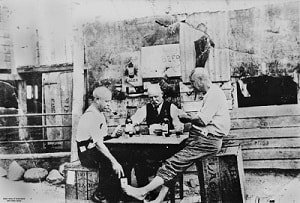Rook, Rooked, Rookie
 Do you play cards? Have you even been conned or taken advantage of? Have you ever felt that you’ve been cheated or ‘rooked’?
Do you play cards? Have you even been conned or taken advantage of? Have you ever felt that you’ve been cheated or ‘rooked’?The word rook is known to have been used in a disparaging manner since around 1500; especially, from 1570 when the word was used describe someone who cheated at cards or dice. By the 1590s, ‘to rook’ meant to cheat. You may have heard the someone say, “He rooked me out of $50!” Other than this, the origins of the word rook are unknown.
This use of the word rook likely found its way into the slang of the British army. For example, in 1868, Rudyard Kipling published a book of poems (Barrack-Room Ballads) imitating the accents and vocabulary of the lower ranks of men in the British colonial army (Gunga Din is perhaps one of the better-known poems from this collection). Kipling used the term ‘raw recruit’ when talking of the newly arrived men from England who were joining the colonial regiments.
As these men were fairly gullible and often ill-educated they were easily taken advantage of by the more experienced men (think of hazing rituals and so on). These new men could easily be ‘rooked’. Perhaps this use of rook may be the origin of the word rookie—someone inexperienced or new to something.
The word rookie came into general use in American English during the Spanish-American War (1898). The Online Etymological Dictionary cites the following from The Midland Monthly magazine (December 1898):
“The rapid growth of a word from a single seed transplanted in a congenial soil is one of the curiosities of literature. Take a single instance. A few weeks ago there was not one American soldier in a thousand who knew there was such a word as ‘rookey’. To-day there are few soldiers and ex-soldiers who have not substituted it for ‘raw recruit’."
Consider another connection between rook and recruit. How do you pronounce recruit? “Ree-croot” or “rook-root”? Perhaps the latter pronunciation is where we might find a possible origin of the word rookie. A ‘rook-root’ could be easily shortened to ‘rookie’.
A rook as described above is not to be confused with the chess piece called a rook which takes its name from the Persian word rukh (chariot), a piece used in early versions of the game.
Reference: Online Etymological Dictionary, https://www.etymonline.com/
Published on August 10, 2020 20:31
No comments have been added yet.



